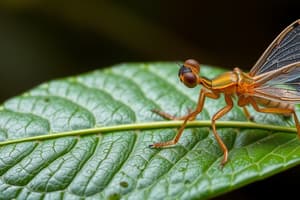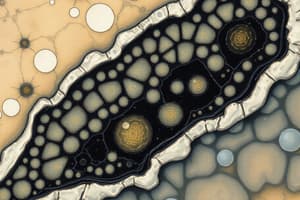Podcast
Questions and Answers
Biology is the scientific study of ______ and living organisms.
Biology is the scientific study of ______ and living organisms.
life
The study of plants is known as ______.
The study of plants is known as ______.
botany
The study of microorganisms is called ______.
The study of microorganisms is called ______.
microbiology
All living organisms are composed of ______, the basic unit of life.
All living organisms are composed of ______, the basic unit of life.
Energy is transferred through ecosystems primarily through food ______ and food webs.
Energy is transferred through ecosystems primarily through food ______ and food webs.
A sexual reproduction involves the contribution of ______ parent(s).
A sexual reproduction involves the contribution of ______ parent(s).
The central theory explaining the diversity of life is ______ selection.
The central theory explaining the diversity of life is ______ selection.
The study of genomes, including sequencing and mapping, is referred to as ______.
The study of genomes, including sequencing and mapping, is referred to as ______.
Flashcards are hidden until you start studying
Study Notes
Overview of Biology
- Biology is the scientific study of life and living organisms.
- It encompasses various branches and fields that explore different aspects of life.
Major Branches of Biology
- Botany: Study of plants, including their physiology, structure, genetics, and ecology.
- Zoology: Study of animals, covering their anatomy, behavior, and classification.
- Microbiology: Study of microorganisms, including bacteria, viruses, fungi, and protozoa.
- Ecology: Study of interactions between organisms and their environment.
- Genetics: Study of heredity, genes, and genetic variation in organisms.
- Evolutionary Biology: Study of the origins and changes in species over time.
Fundamental Concepts
- Cell Theory: All living organisms are composed of cells, the basic unit of life.
- Gene Theory: Traits are inherited through genes, which are passed from parents to offspring.
- Homeostasis: The ability of an organism to maintain stable internal conditions despite external changes.
- Energy Flow: Energy is transferred through ecosystems, primarily through food chains and food webs.
Biological Classification (Taxonomy)
- Organisms are classified into a hierarchical structure:
- Domain
- Kingdom
- Phylum
- Class
- Order
- Family
- Genus
- Species
Key Processes in Biology
- Metabolism: All biochemical reactions occurring within a living organism, including:
- Anabolism (building up)
- Catabolism (breaking down)
- Reproduction: The biological process by which new individual organisms are produced.
- Asexual (one parent)
- Sexual (two parents)
Evolution
- Central theory explaining the diversity of life through natural selection and adaptation.
- Key concepts include:
- Variation: Differences within populations.
- Survival of the Fittest: Organisms best adapted to their environment are more likely to survive and reproduce.
Techniques and Tools
- Microscopy: Use of microscopes to study cells and microorganisms.
- Molecular Biology: Focus on the molecular basis of biological activity.
- Genomics: Study of genomes, including sequencing, mapping, and analysis.
Importance of Biology
- Understanding of health and medicine.
- Conservation of biodiversity and ecosystems.
- Innovation in biotechnology and agriculture.
- Insight into human behavior and psychology through biological frameworks.
Overview of Biology
- Biology is the scientific exploration of life and all living organisms.
- It encompasses multiple branches addressing different dimensions of life.
Major Branches of Biology
- Botany: Involves the study of plant physiology, structure, genetics, and ecology.
- Zoology: Focuses on animal anatomy, behavior, and classification.
- Microbiology: Investigates microorganisms such as bacteria, viruses, fungi, and protozoa.
- Ecology: Examines how organisms interact with each other and their environment.
- Genetics: Explores heredity, genes, and genetic diversity among organisms.
- Evolutionary Biology: Studies the origins of species and their evolutionary changes over time.
Fundamental Concepts
- Cell Theory: Asserts that all life forms are composed of cells, emphasizing cells as the fundamental unit of life.
- Gene Theory: States that traits are inherited through genes, passed from parents to their offspring.
- Homeostasis: Defines the ability of organisms to maintain stable internal conditions despite external environmental changes.
- Energy Flow: Illustrates energy transfer in ecosystems, primarily through structured food chains and webs.
Biological Classification (Taxonomy)
- Organisms are classified hierarchically into eight levels: Domain, Kingdom, Phylum, Class, Order, Family, Genus, and Species.
Key Processes in Biology
- Metabolism: Encompasses all biochemical reactions in living organisms, including:
- Anabolism: Processes that build complex molecules.
- Catabolism: Processes that break down molecules for energy.
- Reproduction: The biological means by which new individuals are formed, which can be:
- Asexual: Involves a single parent.
- Sexual: Involves two parents.
Evolution
- Serves as the foundational theory explaining life diversity, driven by natural selection and adaptation.
- Variation: Refers to the differences observed within populations.
- Survival of the Fittest: Concept that organisms most suited to their environments are more likely to survive and reproduce.
Techniques and Tools
- Microscopy: The use of microscopes enables investigation of cells and microorganisms.
- Molecular Biology: Concentrates on the molecular foundations of biological activity.
- Genomics: The study of genomes, which includes techniques for sequencing, mapping, and analyzing genetic material.
Importance of Biology
- Enhances the understanding of health, medicine, and disease.
- Plays a crucial role in the conservation of biodiversity and ecosystems.
- Drives innovation in biotechnology and agricultural advancements.
- Provides insights into human behavior and psychology from a biological perspective.
Studying That Suits You
Use AI to generate personalized quizzes and flashcards to suit your learning preferences.




